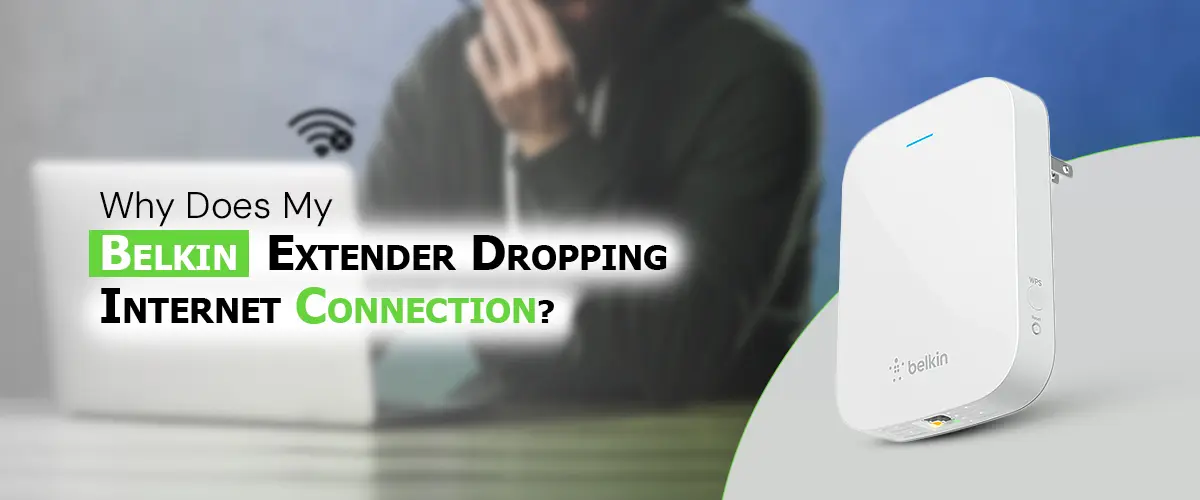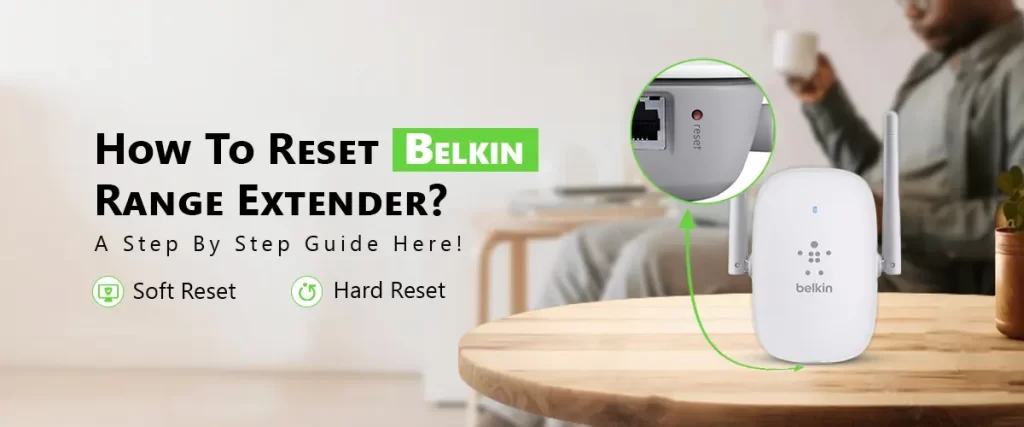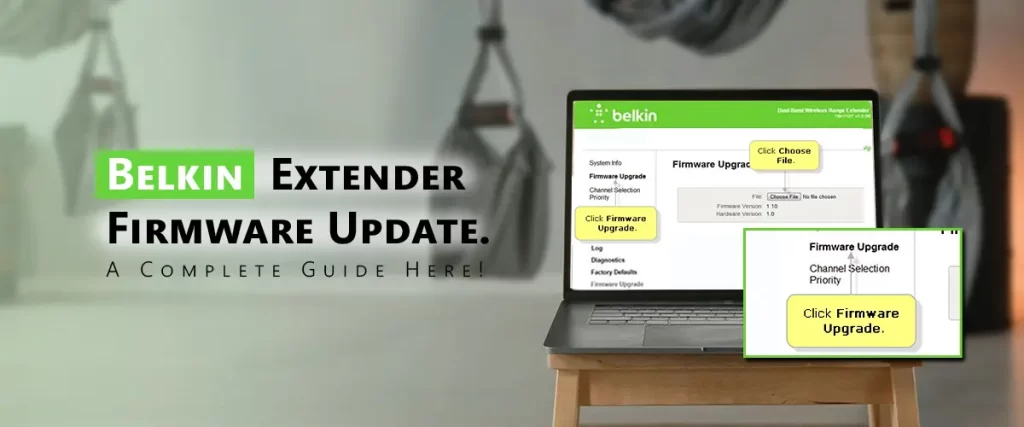
The purpose of Belkin extenders is to boost the Wi-Fi signal in order to provide uninterrupted access in regions with weak signals and broad areas. On the other hand, a lot of customers complain of sporadic connectivity problems, with their Belkin extenders randomly losing internet access. You’re not the only one if you’ve encountered this problem. Although Belkin extenders are typically dependable, unstable connections can result from a number of circumstances. In this blog, we’ll look at the typical causes of your Belkin Extender Dropping Internet Connection and provide fixes to get you back to reliably strong Wi-Fi.
Typical Causes of Your Belkin Extender Dropping Internet Connection
Experiencing internet drops with your Belkin extender? Learn about common causes like signal interference, outdated firmware, or incorrect setup, and how to fix them.
1. A Weak or Sporadic Router Signal
The intensity of the Wi-Fi signal your Belkin extender receives from your network has a big impact on how well it works. An unreliable or weak signal from the router itself will make it difficult for the extender to have a stable connection.
Potential Reasons:
- Physical barriers such as floors, walls, or furniture.
- The parting among router and extender.
- Meddling from other electrical gadgets.
Resolution: Make sure there aren’t many obstacles between your router and the extender and that it is positioned in a prominent, open area. In order to increase the signal strength, move your router or the extender if it is situated distant from it.
2. Antiquated Software
The program that manages the operation of your extender is called firmware. Firmware apprises are frequently out by manufacturers to address issues, boost security, and expand performance. Your Belkin extender might not be operating at its best and experience connection dropouts if the firmware is out of current.
Solution: Go to Belkin’s support page to see if your extender has any firmware upgrades available. To copy and fix fresh firmware version, adhere to the instructions. Updating the firmware guarantees secure and reliable operation of your extender.
3. Disturbances from Different Wireless Networks
Within the 2.4 GHz and 5 GHz frequency ranges, Wi-Fi transmissions operate on many channels. Your Wi-Fi connection may get crowded and frequently disconnect if there are too many neighboring networks utilizing the same channels.
Solution: Check whether channels are being frequently utilized in your area by using a Wi-Fi analyzer tool, which is available as computer software or applications for smartphones. To reduce interference, move your router and extender to less congested channels. The “auto” option on a lot of contemporary routers and extenders allows it to automatically choose the optimum channel.
4. Being Too Hot
Belkin extenders, like any electronic gadget, can overheat if left in poorly ventilated areas or utilized continually for extended periods of time. Reduced performance or Belkin Extender Dropping Internet Connection might result from overheating.
Solution: Make sure your extender is out of direct sunlight and heat sources, and that it is situated in a well-ventilated environment. To allow the extender to cool down, try unplugging it every now and again.
5. Many Linked Devices
Every Wi-Fi network has a certain amount of bandwidth, and an excessive number of connected devices. It might cause the network to overload. Especially on Wi-Fi extenders that are using the same bandwidth as the primary router. This congestion might cause Belkin Extender Dropping Internet Connection.
Solution: Lower the number of devices linked to your network or think about replacing it with a router with more bandwidth so it can manage more devices. Additionally, some extenders have QoS options that let you establish bandwidth priorities for particular devices or uses, like gaming or streaming.
6. Improper Extender Positioning
The performance of your Belkin extender is greatly influenced by where you install it. It won’t get a strong enough signal to extend if it is too far away from your router, which can cause frequent Belkin Extender Dropping Internet Connection drops.
Solution: Halfway between your router and the region where you need a better signal is the best place for your Belkin extender. Signal strength indicators are a common feature on extenders, which helps you locate the ideal location. Try different placements to find the optimal signal.
7. Network Overload
Network congestion may be the cause if you see that your internet connection dips at times when it is most used, such as the nights. This occurs when a large number of individuals in your community are online concurrently, particularly if you’re utilizing a shared network infrastructure, such as cable internet.
Solution: The only thing you can do to alleviate network congestion is to optimize your home network to use as much of your available bandwidth as possible. If the congestion is occurring frequently, you might want to consider switching Wi-Fi channels or getting a higher-speed internet package.
8. Stuck Connections or Faulty Ethernet Cables
A broken or loose Ethernet cable might result in the Belkin Extender Dropping Internet Connection. If you’re using it to link it to your router. This can be the consequence of a worn-out wire or just bad connections.
Solution: Look for evidence of damage, such as frayed or bent connections, on the Ethernet wire. Validate that cable is inflexibly put in to router and extender on both ends. Replace the cable with a new one if you think it may be defective.
9. Wi-Fi Channel Switching on Autopilot
Automatic channel switching is a function found on a lot of contemporary routers that allows the router to swap Wi-Fi channels to prevent interference. This can be advantageous, but if the Belkin extender doesn’t change channels in time with the router. It may potentially result in the connection being lost.
Solution: Verify whether automatic channel switching is turned on in your router’s settings. If so, attempt turning it off or manually designating a channel with the least amount of interference. As an alternative, many extenders have controls for more effectively managing automatic channel changes.
10. Weak Signal from The Extender in The Target Area
Your extender could not be delivering a strong signal to the intended region even though it is getting a strong signal from the router. Particularly if the space is very vast or cluttered with furniture and walls.
Solution: If you’re covering a big area, think about upgrading to a more potent extender. On the other hand, upgrading to a mesh network system or installing an extra extender might offer improved coverage for the whole region.
End Thoughts
Belkin extenders are excellent devices for increasing Wi-Fi signal strength and removing dead areas, but similar to other technological devices. They occasionally have problems that result in Belkin Extender Dropping Internet Connection. Finding the source of your connection issues—be it location, interference, or out-of-date firmware. It will allow you to make the required changes to guarantee a more reliable internet connection.

